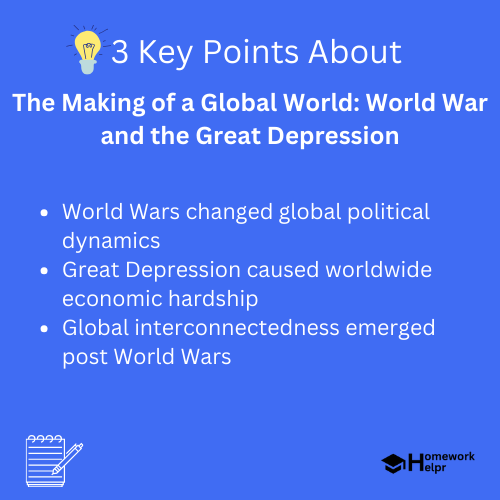📝 Summary
The modern world has been shaped significantly by the events of the World Wars and the Great Depression. The First World War (1914-1918) was a turning point, triggered by various factors, leading to the punitive Treaty of Versailles that contributed to extremist politics and the Second World War (1939-1945). The Great Depression, starting in 1929, triggered economic devastation and widespread unemployment. Ultimately, these events fostered a new understanding of global interconnectedness, paving the way for international cooperation and organizations like the United Nations.
The Making of a Global World: World War and the Great Depression
The modern world we live in today has been shaped by significant historical events that have made lasting impacts on societies, economies, and cultures across the globe. Two of the most pivotal events in the 20th century that contributed immensely to the global landscape are the World Wars and the Great Depression. Understanding these events helps us appreciate the complexities of global interconnectedness.
The World Wars: Shaping the Global Order
The First World War, which lasted from 1914 to 1918, marked a turning point in history. It was triggered by a variety of factors, including militarism, alliances, imperialism, and nationalism. This horrific war led to the loss of millions of lives and immense destruction.
In the aftermath, the Treaty of Versailles was signed in 1919, imposing heavy reparations on Germany and redrawing borders in Europe. This treaty, characterized by the principle of punitive justice, contributed significantly to the rise of extremist politics in Germany, eventually leading to the Second World War.

The Second World War (1939-1945) was even more catastrophic, involving vast resources and leading to unprecedented casualties. It was fought between the Allied Powers and the Axis Powers and introduced new warfare technologies including tanks, aircraft, and naval vessels.
Definition
Militarism: The belief that a country should maintain a strong military capability and be prepared to use it aggressively to defend or promote national interests.
Definition
Reparations: Payments made by a defeated country to compensate for damage caused during a war.
Examples
Example 1: The assassination of Archduke Franz Ferdinand in 1914 is often cited as the spark that ignited World War I.
Examples
Example 2: The launch of atomic bombs on Hiroshima and Nagasaki in 1945 showcased the devastating technological advancements during World War II.
The Great Depression: Economic Downturn
Following the instability generated by the World Wars, the world faced another significant crisis: the Great Depression, which began in 1929 and lasted through the 1930s. This economic downturn started with the stock market crash in the United States, leading to widespread unemployment, poverty, and hardship across the globe.
The Great Depression had far-reaching effects. Banks failed, businesses closed, and international trade plummeted. Countries struggled to restore economic stability, and governments intervened through various measures, including public works programs and financial reforms.
- Economic isolationism became prevalent as nations turned inward, trying to stabilize their own economies.
- Global trade would contract significantly, leading to a vicious cycle of economic failure.
- Countries like Germany, already suffering from the repercussions of the Treaty of Versailles, found their economies in further turmoil.
Global Interconnectedness and Aftermath
The combination of the World Wars and the Great Depression transformed the concept of global connectedness. Post World War II, countries realized that collaboration was paramount for economic recovery and peace. This realization led to the establishment of international organizations, like the United Nations, to foster cooperation.
In this new global order, the world moved towards economic, political, and cultural interdependence. Free trade agreements, international treaties, and globalization began to emerge as dominant themes that defined relationships between nations.
❓Did You Know?
It is estimated that during the Great Depression, unemployment rates reached as high as 25% in the United States.
The Legacy: Lessons Learned
Reflecting on these historical events teaches us important lessons. One significant takeaway is the importance of collaboration among nations. Economic problems do not respect borders; thus, international cooperation is crucial in addressing global challenges.
Furthermore, the ideologies that led to the extreme nationalism during the World Wars serve as a cautionary tale. Moving forward, nations must recognize the value of unity and understanding across cultures to prevent conflict.
Conclusion
The making of a global world through the trials of the World Wars and the Great Depression has left an indelible mark on history. These events remind us of the complexity of human interactions and the consequences of conflict and economic crises. As global citizens today, we carry the responsibility of understanding our world‚’ past to guide us toward a more united and peaceful future.
These historical events illustrate the importance of staying informed and engaged in global matters, ensuring that the mistakes of the past are not repeated. In a world where challenges are common yet interconnected, history serves as our most valuable teacher.
Related Questions on The Making of a Global World: World War and the Great Depression
What were the main causes of World War I?
Answer: Militarism, alliances, imperialism, and nationalism led to World War I.
What impact did the Treaty of Versailles have?
Answer: It imposed reparations on Germany and redrew European borders.
How did the Great Depression start?
Answer: It began with the stock market crash in the United States.
What led to the formation of the United Nations?
Answer: Post-World War II collaboration for economic recovery and peace led to the UN’s formation.
